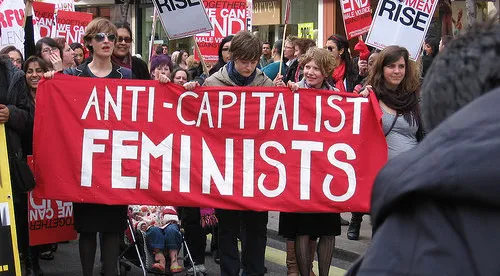Rethinking Feminism: Why the Fight for Equality Must Be Anticapitalist and International
The fourth wave of feminism has transformed the global conversation on gender equality. From Latin America to Europe and Africa, women and LGBTQIA+ communities have filled streets demanding an end to violence, pay inequality, and state control over their bodies. But as the far right rises and neoliberal systems tighten their grip, it’s clear that the struggle for liberation cannot be separated from the fight against capitalism. For an Anticapitalist, Revolutiona…

Introduction: The Fourth Feminist Wave and Its Turning Point
The fourth wave of feminism, emerging around 2012, marked a global shift in the struggle for gender equality. From Latin America’s Ni Una Menos movement to massive March 8 demonstrations in over 80 countries, women and LGBTQIA+ people took to the streets demanding an end to gender-based violence, pay inequality, and state control over their bodies.
This new wave wasn’t just about hashtags—it fused online activism with street protests, becoming a key expression of popular resistance against neoliberalism and patriarchy. Yet, as movements gained ground, so did their opponents. The rise of far-right regimes across continents has led to coordinated attacks on women’s and LGBTQIA+ rights, revealing the deep connection between patriarchy, capitalism, and authoritarianism.
True liberation requires more than policy reforms—it demands dismantling the systems that sustain inequality. That’s where anticapitalist feminism comes in: a feminism that understands oppression as both economic and social, and fights for transformation, not adaptation.
The Global Backlash: How the Far Right Targets Gender Equality
Around the world, far-right governments have turned gender rights into a battleground.
In the U.S., conservative movements rooted in evangelical Christianity have pushed anti-abortion laws and rolled back reproductive rights.
In South America, Brazil’s Bolsonaro and Argentina’s Milei have dismantled policies protecting women and LGBTQIA+ people while preaching “family values.”
In Africa, governments like Uganda’s have enacted brutal anti-LGBTQ laws, often supported by Western right-wing groups.
In the Middle East, laws restricting women’s freedom and enforcing religious control over family life remain widespread.
In Europe, far-right figures like Giorgia Meloni use feminist rhetoric while promoting xenophobic and patriarchal policies.
This global offensive aims to restore an outdated idea of the “traditional family,” pushing women back into unpaid domestic labor and normalizing control over their bodies. The far right’s so-called “defense of family values” is, in reality, a defense of the capitalist order that depends on women’s subordination.
Capitalism and Patriarchy: Two Systems, One Purpose
To understand why gender inequality persists, we must look at its roots. Patriarchy existed long before capitalism, but capitalism refined it into a tool for profit.
Family as an economic unit: Women’s unpaid domestic and care work sustains the labor force while remaining invisible in economic statistics.
Sexual division of labor: Women are channeled into low-paying, precarious jobs, while men dominate higher-paying sectors.
Control over bodies: From beauty standards to abortion bans, capitalism commodifies women’s bodies while policing sexuality.
Capitalism relies on patriarchy to maintain social control and cheap labor. Meanwhile, patriarchy relies on capitalism’s institutions—state, church, and media—to reproduce gender hierarchies. The result is a system that thrives on inequality and rewards exploitation.
Institutional Feminism and the Illusion of Progress
Over the past decade, “progressive” governments have often embraced feminist language while maintaining capitalist policies. This form of institutional feminism celebrates representation—more women in politics, in boardrooms, or on magazine covers—without addressing the material causes of inequality.
The reality is that representation without redistribution changes little. While elite women may rise through the ranks, working-class women continue to face wage gaps, unsafe workplaces, and violence at home. Legal victories like abortion rights or same-sex marriage are important but fragile. Under capitalism, every gain can be rolled back when it threatens profit or power.
Anticapitalist feminism insists that true progress cannot come from the same system that created inequality it must come from collective struggle and social transformation.
Feminism Must Be International and Revolutionary
Women’s oppression is global, and so must be the fight against it. Across borders, capitalism, imperialism, and patriarchy reinforce one another. Wars, climate crises, and economic collapse hit women hardestb especially those who are poor, Black, Indigenous, migrant, or LGBTQIA+.
In conflict zones from Gaza to Sudan, women face sexual violence and displacement. In the Global South, privatization and debt destroy access to healthcare, education, and housing. Meanwhile, global corporations profit from low-wage labor performed mostly by women.
An internationalist feminism recognizes that women’s liberation in one country is tied to liberation everywhere. Solidarity among women workers, queer activists, and social movements worldwide is not charity it’s strategy.
The False Promise of “Woke” and Bourgeois Feminism
In recent years, feminism has been split between competing ideologies. On one end, bourgeois feminism focuses on individual advancement—“breaking the glass ceiling”—without challenging the economic structure that keeps most women down. On the other, woke liberalism reduces liberation to language and representation, often ignoring material realities like poverty, housing, and unpaid labor.
Both approaches are limited. They make feminism comfortable for capitalism. Anticapitalist feminism, by contrast, insists that gender, class, race, and sexuality are inseparable and must be confronted together.
The Role of the Working Class in Feminist Struggle
No feminist revolution can succeed without the working class. Women form a major part of the global workforce, often concentrated in essential yet undervalued sectors like healthcare, education, and domestic labor. These workers hold the power to disrupt production and challenge exploitation directly.
An anticapitalist feminist movement must therefore unite workplace struggles with gender struggles. Equal pay, shorter working hours, maternity and paternity leave, and the socialization of domestic labor—through public childcare, communal kitchens, and social housing—are not “women’s issues.” They are class issues.
When feminist movements align with labor movements, they become unstoppable forces for change.
Against All Gender-Based Violence
Violence against women and LGBTQIA+ people is not random—it’s systemic. It reflects power structures that define who controls bodies, resources, and labor. From femicides and sexual assault to harassment at work, patriarchal violence is a mechanism of social control.
Ending it requires more than tougher laws. It requires dismantling the conditions that make violence profitable or tolerated. Public funding for shelters, education on consent, workplace safety committees, and the removal of religious influence in law and policy are essential first steps.
True prevention means ending economic dependency, ensuring reproductive rights, and breaking the family structures that normalize subordination.
The Intersection of Climate, War, and Migration
Capitalism’s crises—climate change, imperialist wars, and forced migration—intensify gender inequality. Women and marginalized communities often bear the heaviest burdens: losing homes to floods, livelihoods to drought, or loved ones to war.
Ecofeminism and anticolonial feminism expose how the exploitation of women mirrors the exploitation of the planet. Both are treated as resources to be controlled. A socialist, feminist, and ecological transition must replace extractivism and militarism with collective care and community-led sustainability.
Toward a Revolutionary Feminist Future
Anticapitalist feminism does not seek to integrate women into the current system—it seeks to transform it entirely. Its goals go beyond equality under capitalism; they aim for liberation from it.
That means:
Abolishing patriarchal family structures that confine women to unpaid care work.
Guaranteeing reproductive rights, including free and safe abortion.
Secularizing the state and ending all religious interference in law and healthcare.
Ensuring universal access to education, housing, and healthcare.
Building worker-led unions and international movements that unite all oppressed groups.
The ultimate aim is socialism: a system where production serves human need, not profit. Under socialism, domestic work would be socialized, gender hierarchies dismantled, and care recognized as a collective responsibility.
Conclusion: Feminism for the 21st Century
The struggle for gender liberation is at a crossroads. The choice is clear: a feminism that adapts to capitalism or one that fights to end it.
Anticapitalist feminism offers a path forward—one rooted in solidarity, class struggle, and revolutionary transformation. It understands that patriarchy cannot be reformed and that equality within capitalism is an illusion.
The liberation of women, LGBTQIA+ people, and all oppressed groups is inseparable from the liberation of the working class. Only by uniting these struggles across borders can we build a world free from exploitation, violence, and domination.
Share this article
Help others discover this content
Share on your favorite platform and help spread the word!



